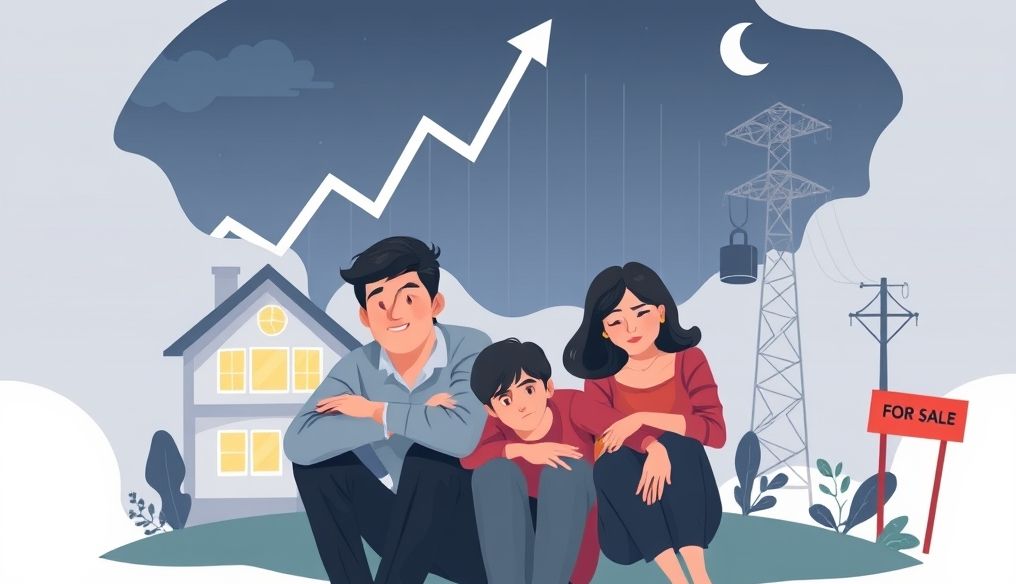Introduction: The Challenges of Economic Crises
Economic crises, whether caused by market volatility, rising inflation, or global events, pose significant challenges to individuals and families. Purchasing power is affected, the cost of living rises, and anxiety about the financial future increases. Therefore, sound financial planning and effective management of financial resources are essential to navigate these difficult times with minimal losses.
Chapter 1: Understanding the Nature of the Economic Crisis and its Impact
Before developing strategies for managing money, it is important to understand the nature of the current economic crisis and its potential impact on your financial situation. Is it an inflation crisis? Is it an economic recession? Is it a crisis related to a specific sector? Understanding these factors will help you make informed decisions.
- Inflation: Rising prices and erosion of the purchasing power of money.
- Economic Recession: Declining economic growth and rising unemployment rates.
- Financial Crises: Collapse of financial institutions and their impact on markets.
Chapter 2: Assessing Your Current Financial Situation
The first step in managing money in a crisis is an accurate assessment of your current financial situation. This includes:
- Calculating Net Worth: Assets (savings, investments, real estate) minus liabilities (loans, debts).
- Analyzing Income and Expenses: Identifying different sources of income and classifying expenses (essential, non-essential).
- Evaluating Debts: Identifying types of debts (credit cards, personal loans, mortgages) and interest rates.
Chapter 3: Creating an Emergency Budget
An emergency budget is the first line of defense against economic crises. It should include:
- Reducing Non-Essential Expenses: Identifying expenses that can be eliminated or reduced (entertainment, restaurants, subscriptions).
- Increasing Savings: Allocating a portion of income to savings, even if it is a small amount.
- Prioritizing Spending: Focusing on meeting basic needs (food, housing, healthcare).
Chapter 4: Building an Emergency Fund
An emergency fund is a sum of money set aside to cover unexpected expenses, such as job loss or emergency home repairs. It is recommended that the emergency fund cover living expenses for at least 3-6 months.
Tip: Start by allocating a small amount each month to the emergency fund, and gradually increase the amount until you reach the desired goal.
Chapter 5: Managing Debt Effectively
In economic crises, debt can become a heavy burden. It is essential to manage debt effectively by:
- Identifying High-Interest Debts: Focusing on paying off debts with the highest interest rates first.
- Negotiating with Creditors: Trying to negotiate better repayment terms, such as reducing the interest rate or extending the repayment period.
- Avoiding New Debt: As much as possible, avoid taking on new debt during the crisis.
Chapter 6: Reviewing Investment Plans
Investments may be affected by economic crises, so it is important to review investment plans and assess risks. The review should include:
- Diversifying Investments: Distributing investments across different assets (stocks, bonds, real estate) to reduce risk.
- Focusing on Long-Term Investments: Avoiding frequent buying and selling of investments based on short-term market fluctuations.
- Consulting a Financial Advisor: Seeking advice from a qualified financial advisor to assess risks and make appropriate investment decisions.
Chapter 7: Seeking Additional Sources of Income
In the face of economic crises, it may be necessary to seek additional sources of income to enhance financial stability. These sources may include:
- Part-Time Work: Looking for a part-time job or freelance work.
- Selling Unnecessary Assets: Selling assets that are no longer needed or used (extra car, jewelry).
- Renting Properties: If you have unused properties, you can rent them out for additional income.
Chapter 8: Utilizing Government Programs and Assistance
During economic crises, governments may offer assistance programs and financial support to affected individuals and families. You should research these programs and take advantage of them if you are eligible.
Examples: Unemployment support programs, housing programs, healthcare programs.
Chapter 9: Planning for the Future
In addition to managing the current crisis, it is important to plan for the future. Planning should include:
- Setting Long-Term Financial Goals: Identifying the financial goals you want to achieve (retirement, children's education, buying a home).
- Developing a Plan to Achieve These Goals: Identifying the steps needed to achieve financial goals, including saving and investing.
- Reviewing the Plan Regularly: Reviewing the financial plan regularly and adjusting it as needed.
Chapter 10: Maintaining Mental Health
Economic crises can affect mental health, so it is important to maintain mental health by:
- Communicating with Friends and Family: Talking about your concerns and feelings with friends and family.
- Exercising Regularly: Exercising helps relieve stress and anxiety.
- Getting Enough Sleep: Getting enough sleep helps improve mood and focus.
- Seeking Professional Help: If you are experiencing anxiety or depression, seek help from a mental health professional.
Conclusion: Managing personal and family finances in the face of economic crises requires careful planning, continuous assessment of the financial situation, and making informed decisions. By following the strategies outlined in this article, you can protect your money and enhance your financial stability in the face of economic challenges.




